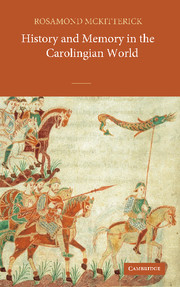Book contents
- Frontmatter
- Contents
- Preface
- Acknowledgements
- List of abbreviations
- 1 Introduction: History and memory in the Carolingian world
- 2 Carolingian history books
- 3 Paul the Deacon's Historia langobardorum and the Franks
- 4 The Carolingians on their past
- 5 Politics and history
- 6 Kingship and the writing of history
- 7 Social memory, commemoration and the book
- 8 History and memory in early medieval Bavaria
- 9 The reading of history at Lorsch and St Amand
- 10 Texts, authority and the history of the church
- 11 Christianity as history
- 12 Conclusion: History and its audiences in the Carolingian world
- Bibliography
- Index of manuscripts
- General index
7 - Social memory, commemoration and the book
Published online by Cambridge University Press: 15 December 2009
- Frontmatter
- Contents
- Preface
- Acknowledgements
- List of abbreviations
- 1 Introduction: History and memory in the Carolingian world
- 2 Carolingian history books
- 3 Paul the Deacon's Historia langobardorum and the Franks
- 4 The Carolingians on their past
- 5 Politics and history
- 6 Kingship and the writing of history
- 7 Social memory, commemoration and the book
- 8 History and memory in early medieval Bavaria
- 9 The reading of history at Lorsch and St Amand
- 10 Texts, authority and the history of the church
- 11 Christianity as history
- 12 Conclusion: History and its audiences in the Carolingian world
- Bibliography
- Index of manuscripts
- General index
Summary
In this chapter I shall explore the theme of history and memory by looking at two further kinds of book created in the Carolingian period.
The first of these is the cartulary. Cartularies are generally regarded as straightforward collections of the legal records and rights to property of a religious foundation. They survive in great abundance from the eleventh and twelfth centuries from all over Europe and incorporate copies of older documents which were then for the most part discarded. Recent work such as that of Barbara Rosenwein and Constance Brittan Bouchard, however, has established that the charters also record the social bonds created between the donors (for the most part members of the local community) and the monastery or local church. Further, Patrick Geary has noted how the exchanges of property recorded in the cartularies both altered and clarified relationships among the living and the bonds with the dead; they created an image of social stability in which the church was involved. Cartularies, therefore, had a commemorative and liturgical as well as legal function.
The second type of book is the confraternity book, also known as a Liber vitae or Liber memorialis. This listed names of the living and the dead to be prayed for in a number of institutions. Study of these remarkable books, notably by the ‘Freiburg school’, has made them yield evidence touching on the history, structure and kinship of local families, the personnel of monasteries in the Frankish realms and the network of spiritual and written communications between them.
- Type
- Chapter
- Information
- History and Memory in the Carolingian World , pp. 156 - 173Publisher: Cambridge University PressPrint publication year: 2004



